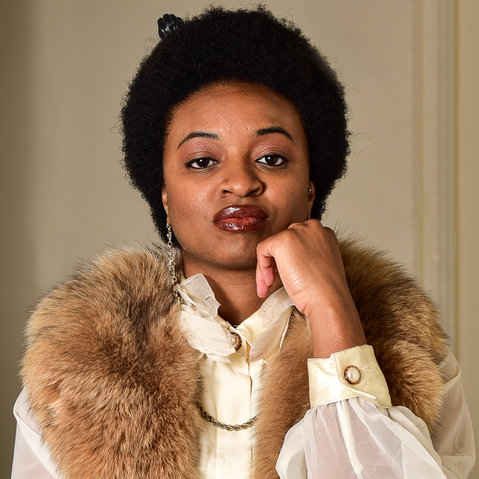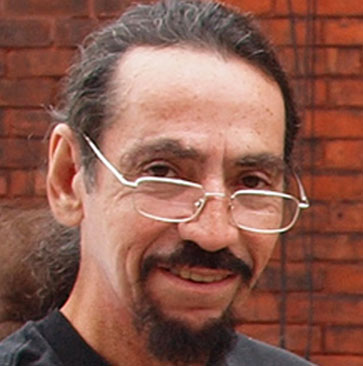Drugged by his bodyguard, who was a paid FBI informant, the gifted speaker, community organizer, activist, and rising star within the Black Panther Party was unconscious alongside his pregnant fiancee when federal and state agents, as well as heavily armed police, stormed the place around 4:45 a.m. on December 4, 1969.
The tactical unit—dubbed an “execution squad” by a fellow Panther in the days after the raid—followed a map of the flat supplied by their inside source, and after firing nearly 100 rounds, including consecutive barrages from a Thompson submachine gun, mostly at Hampton’s bedroom, but only wounding him, they shot him twice at point-blank range, in the head.
Fred Hampton was one of the many targets of a covert FBI operation seeking to destroy the black activist group, anti-war organizations, civil rights leaders, and others. Codenamed COINTELPRO—short for Counter Intelligence Program—one of its stated missions was “to expose, disrupt, misdirect, discredit or otherwise neutralise the activities of black-nationalist, hate-type organisations and groupings, their leadership, spokesmen, membership and supporters…”
Another, “to prevent the rise of a ‘messiah’ who could unify, and electrify, the militant black nationalist movement…”
Spearheaded by then-FBI Director J. Edgar Hoover, COINTELPRO sought the destruction of those activists and movements deemed threatening to the status quo of the day, by any means necessary—trampling on the constitutionally protected rights of free speech and dissent in the process, and annihilating anyone bold enough to speak truth to power.
Others individuals and groups named within since-released, though highly redacted FBI documents detailing aspects of the program are Rev. Dr. Martin Luther King, Jr., Malcolm X, Stokely Carmichael, the Southern Christian Leadership Conference (SCLC), Student Nonviolent Coordinating Committee (SNCC), Nation of Islam, and many more.
Launched in 1956, COINTELPRO was purportedly officially shut down in 1971 following its public exposure by activists who leaked stolen classified FBI files documenting many of its methods and targets to media outlets. Sources interviewed for this story, recently publicized internal government documents, policies, and responses to modern-day protests, however, detail how COINTELPRO’s sinister tactics and spirit of demonizing activism and criminalizing dissent among marginalized communities—whether indigenous peoples, immigrants, religious groups, such as Muslim Americans, and especially African Americans—are very much alive and well today.
“COINTELPRO never, never went away—never,” explains acclaimed journalist, political activist and executive editor of progressive online video news network Black Agenda Report, Glen Ford. “Certainly, after 9/11, everybody should be aware that the national security state went into high gear. This is a country that spies—and is not ashamed—on its own allies, the heads of state of Germany, the head of Brazil, on its friends in high places.
“Well what do you think they are doing in terms of spying on the folks that they think are organizing dissent among the most despised people in the United States—black America?’ he continues. “COINTELPRO never went out of business.”
BLACK POWER
It’s impossible to fully express or adequately quantify just how seismic an impact the Black Panther Party had on the African American community at the time.
Founded in Oakland, California in 1966 by Bobby Seale and Huey Newton, the Black Panther Party for Self-Defense stood for liberation, nationalism, and equality, even revolution, of an entire race, whose ancestors were literally stolen from Africa and sold into slavery to serve white masters in what would so proudly come to hail itself as the “Land of the Free.”
Countless perished aboard over-packed ships during the transatlantic slave trade. Thousands more were lynched throughout the South for ‘crimes’ as innocent as looking at a white woman. Jim Crow laws disenfranchised and criminalized long after the Civil War officially ‘ended’ slavery, among other abuses, mandating separate bathrooms, restaurants, schools, water fountains, and prohibiting access to plenty of other services based on the color of one’s skin.
Relegated to so-called ‘Negro ghettos’—how impoverished black neighborhoods were described in the Sixties, even on national television—and extreme poverty, African Americans were subjected to systemic mechanisms of oppression that permeate society through today.
Yet here was a movement celebrating blackness. Here was an organization heralding ‘Black Is Beautiful.’ Here was a group calling for black empowerment.
In 1966, at the time of the Black Panthers’ creation, it was legal for citizens to carry firearms in public, and that’s what members did—armed ’copwatching’ to ensure police officers didn’t abuse the communities they served during the course of their duties to serve and protect.
One of the initial responses? Repeal that right. When more than two dozen armed members showed up at the California State Capitol the following year to protest the associated legislation—called the Mulford Act, passed shortly after—the group made national headlines.
The Panthers maintained a ‘10-Point Program’ throughout their existence. These were core tenets published in their weekly newspaper The Black Panther, and organized into two sections of goals and beliefs.
Among their stated objectives: “freedom,” “full employment,” “decent housing,” “education that teaches us our true history and our role in the present day society,” “an immediate end to POLICE BRUTALITY and MURDER of Black people.”
The Panthers also instituted community social service initiatives, such as its Free Breakfast for School Children Program, which supplied cooked meals to tens of thousands of inner city youth.
FBI records and historical evidence proves that the Black Panthers, from its immediate offset, were destined for the crosshairs of destruction by the U.S. government—joining the ranks of others who’d demanded similar reforms and calls for justice and equality, even those who dedicated their lives to non-violent protest.
Michael German, a fellow with the nonprofit Brennan Center for Justice’s Liberty and National Security Program, and former FBI special agent, outlines some of the nefarious strategies deployed against one of COINTELPRO’s most famous victims:
“The types of tactics that the FBI used during the COINTELPRO era, particularly targeting Dr. Martin Luther King, involved widespread surveillance, the use informants within his movement, but then what were called disruption tactics,” he tells News Beat podcast. “These included writing letters and included sending audiotapes of extra-marital affairs to his wife, trying to get the Nobel Committee not to give him a Nobel Peace Prize, writing letters saying he had this dastardly secret life, and in fact, ultimately sent a letter to him threatening to expose everything the FBI knew about him if he accepted the Nobel Peace Prize, and suggesting that rather than go through that humiliation, he might look for another way out, which has been interpreted as pressure for him to commit suicide.
“But these weren’t unusual,” continues German. “The FBI sent these targeting college professors and students, and others, where they disrupted people’s lives, even where they committed no crime, and in fact were just trying to express opinions that the director of the FBI, J. Edgar Hoover, the FBI agents working those cases, found repelling to them.”
Following the leaking of classified documents chronicling some of COINTELPRO’s nefarious misdeeds to the media by activists who’d broken into a Pennsylvania FBI field office in 1971, the program got additional public airtime four years late—when then-U.S. Senator Frank Church led what stands as perhaps the most detailed probe into the abusive and illegal covert operations of the CIA, FBI, IRS and NSA, in history.
Known as the Church Committee, among its many shocking revelations were global extrajudicial assassination plots, illegal domestic surveillance schemes, smear campaigns, and scores upon scores of other secret, often-lethal actions perpetuated by the U.S. government.
As sinister as the domestic surveillance, infiltration, and disruption of individuals and groups speaking out against racially motivated and socioeconomically crushing policies and actions may be—especially since the United States touts itself as the global purveyor of freedom—German and others interviewed for this story, as well as recently leaked FBI documents, and other sources, detail how these very same tactics are being unleashed today.
‘BLACK IDENTITY EXTREMISTS’
That’s who the FBI deemed major threats to officers within an August 2017 internal ‘law enforcement sensitive’ FBI Intelligence Assessment, despite previous analyses warning of growing violence among white, right-wing nationalist groups.
The 12-page report, obtained by news outlet Foreign Policy and detailed in a Dec. 6 article that year on its website titled “The FBI’s New U.S. Terrorist Threat: ‘Black Identity Extremists,” reads:
“The FBI assesses it is very likely Black Identity Extremist (BIE) perceptions of police brutality against African Americans spurred an increase in premeditated, retaliatory lethal violence against law enforcement and will very likely serve as justification for such violence.”
“The FBI assesses it is very likely incidents of alleged police abuse against African Americans since then have continued to feed the resurgence in ideologically motivated, violent criminal activity within the BIE movement,” it continues.
As the Foreign Policy piece points out, the FBI report’s publication came ironically as white hate groups were descending upon Charlottesville, Virginia, for a ‘Unite The Right’ rally that took place on August 11 and 12 and left one counter-protestor dead after being intentionally rammed by a car driven by a self-proclaimed white supremacist.
German, whose work focuses on law enforcement and intelligence oversight and reform and whom specialized in domestic terrorism and covert operations during his tenure with the FBI, finds the report and the term ‘Black Identity Extremist’ disturbing on several fronts, voicing his concerns before the Congressional Black Caucus in March 2018.
“The assessment is of such poor analytic quality that it raises serious questions about the FBI’s purpose in producing it,” he testified. “What is most troubling about the BIE assessment is its potential to incite irrational police fear of black political activists. Irrational fear, unfortunately, too often in the past translated into unnecessary police violence against unarmed and unthreatening black men and women.”
German expands on his condemnation—and the FBI report’s dangers—with News Beat podcast.
“It was problematic from a number of standpoints,” he says. “First, its concept of what it called a ‘Black Identity Extremist’ movement was extremely convoluted and overbroad in a way that basically would incorporate any person who identified as black, who was concerned about police violence and police racism. So that covers pretty much everyone, and part of the problem with a lot of these reports is that they’re so poorly written that they’re not really providing any advice to law enforcement about what to do.
“And this report in particular suggested that this movement that the FBI imagined—this “Black Identity” movement—was a threat to police officers,” he continues. “And that causes a substantial problem, because basically, what it was teaching police is to be afraid of black activists, and to look at black activists as a threat to them. And with this concept of a war on police gaining traction within law enforcement, this report would only heighten that fear rather than mitigate it.
“Because really, it only points to a handful of cases, and again, the analytics are so bad that if you look at those cases they’re not people who are associated with each other or some unique movement or belief system, they’re individuals who engaged in violence against police or plotted to in one case, and they only have six cases over a two-year period,” adds German. “It seemed to be imagining a movement out of almost nothing.”
Such assessments and terminology are also extensions of COINTELPRO’s racially charged criminalization of African Americans, explains Ford, the veteran journalist and executive editor of Black Agenda Report.
“When this BIE nomenclature came up, it simply reminded us that the COINTELPRO-like programs never die, but they do change nomenclature,” he tells News Beat podcast in a classroom at John Jay College of Criminal Justice during progressive activism nonprofit Left Forum‘s 2018 conference. “They change their bureaucratic identities, but it’s always the same. This country has had in effect a counterinsurgency program to which many billions of dollars is committed, certainly ever since the late ’60s. The mass incarceration regime that was put into effect was the United States’ answer to the Black Liberation Movement of the ’60s. ‘If you don’t stay in your place, we’ve got a place for you.’ And that is prison.
“And that’s why almost every one of every eight prisoners in the world is an African American,” continues Ford. “It’s not just overt political espionage surveillance that goes on against the black community, trying to find, fix and destroy black political dissidents, no, it is general, because of the mass black incarceration state. The black community is generally surveilled, generally targeted to be contained and suppressed. You don’t have to be political for you to be targeted. All you have to do is be black.
“Black communities are divided up into hyper-surveillance zones, with misleading nomenclature like high-crime areas or high-violence or gun crime areas, or most commonly, drug zones,” he adds. “But these are hyper-surveillance zones, and at some level it becomes almost meaningless to separate the overtly political surveillance of black identity extremists from the routine surveillance of black America, which is where you will find all those cameras by the thousands going up on street corners.”
It’s this constant creeping, overreaching, and weaponizing of ever-more-technologically advanced mass surveillance capabilities and methods that groups such as nonprofit The Center for Media Justice, strive to expose, combat, and rein in.
BACK TO THE FUTURE
Nowadays, when accessing the FBI’s electronic FOIA [Freedom of Information Act] Library, called The Vault, which contains nearly 7,000 documents and media cleared for public viewing through its website, a likely commonly overlooked sentence appears a the very bottom of its homepage:
“Please note: the content of the files in the Vault encompasses all time periods of Bureau history and do not always reflect the current views, policies, and priorities of the FBI.”
It’s the latter half that always somehow seems to jump out.
“…do not always reflect the current views, policies, and priorities of the FBI.”
Focusing solely on those those views, policies, and priorities relating to COINTELPRO encompasses a hell of a lot, and to Glen Ford’s earlier assessment about the program’s eternal life though “change in nomenclature,” the documents chronicling its admitted misdeeds against Dr. Martin Luther King, Jr., and other African American civil and human rights leaders and groups calling for justice and equality regardless of the color of one’s skin are filed under “Black Extremists”—a mere word shy from its controversial present-day incarnation “Black Identity Extremists.”
Steven Renderos, organizing director at The Center for Media Justice, also picks up on this not-so-coincidental wording, as well as the continuation of the surveillance strategies it so infamously authorized.
“It’s interesting to see some of the tactics of COINTELPRO, how they’ve been replicated, even today,” he tells News Beat podcast. “You saw a lot of false reports in the media, you saw harassment, false imprisonment. We see some of the same language emerging even in how surveillance of black activists is happening today. The term ‘Black Identity Extremism’ is actually riddled all over the COINTELPRO document. So it wasn’t necessarily tied to any specific threat of violence against the state, it was really anyone who was really challenging the social order, or the political order, of things at that time.
“So today we see the designation of Black Identity Extremists by the FBI and how that’s being used to justify deeper layers of surveillance of black activists, people who are out there protesting against violence from police in black communities, people who are protesting the disinvestment of government and infrastructure in black communities,” he continues. “These folks are now the source of surveillance that’s coming from law enforcement agencies at the federal level, but also law enforcement agencies at the hyperlocal level.”
Citing the motto of a fellow anti-surveillance group that’s currently working to track, publicize and stop government-sanctioned spying and intelligence gathering, he explains the long, shameful history of such efforts specifically targeting marginalized communities of color.
“The Stop LAPD Spying Coalition based out of Los Angeles has this saying that goes: ‘Surveillance is not a moment in time, it’s a continuation in history,’” he tells News Beat podcast. “A lot of what we see in the realm of surveillance is that while in today’s context we understand surveillance to affect everyone, and largely because of the technology and the tools that we use, it has always impacted very specific communities more than others.
“We can go back, as far back as the time of slavery and Reconstruction, where policies were put into place—like the New York Lantern Laws—that prevented someone who was an African American to walk down the street at night without having a lantern on them,” he continues. “Now this was done for a couple of different reasons, one is to make their black bodies [visible] to the eyes of white people in their city. The second reason for it was very deliberate: to prevent black folks from actually engaging in conversation with each other at night. The idea being that if there was to be subversiveness or plans of uprisings that they would likely happen at night.
“So the Lantern Laws were seen as the deterrent to prevent black communities from coming together and organizing,” adds Renderos. “We’ve seen other examples throughout history where surveillance has been specifically targeted toward those who are the state, the government, would consider political dissidents. So we saw this particularly around the Civil Rights movement with the emergence of the counterintelligence program COINTELPRO, which had a very specific mission: It was to expose, disrupt, misdirect, discredit and neutralize any groups of people, organization, that would threaten the national security of the United States and would threaten the social and political order of the state.
“So who got caught up in the dragnet of that surveillance became activists, like Martin Luther King, Jr., Malcolm X, organizers in the Black Panther Party, anti-war protesters, students organizing for Puerto Rican independence,” he says. “Basically, anyone that represented any sort-of a threat to the current order of the establishment became a target of surveillance.”
POWER TO THE PEOPLE
Fred Hampton, who at just 21 had ascended to the chair of the Illinois chapter and deputy chair of the national Black Panther Party before being murdered, execution-style, by Chicago police in that predawn raid—while he was asleep—had an infectious saying he’d often have audiences repeat as a call-and-response during his speeches and lectures.
“I am a revolutionary.”
A renowned orator who delivered fiery, impassioned remarks with the extraordinary ability to inspire and convert listeners across race lines, he’d been restlessly working to grow and unify the movement prior to his demise, and it was working.
By many accounts, Hampton had successfully forged meaningful alliances with several other sizable groups sharing the thirst for significant change in America. He was positioning the Black Panthers as a group representative of all those struggling against oppression, inequality, and injustice, and building a multiracial coalition—explicitly violating and challenging one of the explicit “long-range goals” outlined in a March 1968 FBI COINTELPRO directive:
“Prevent the rise of a ‘messiah’ who could unify, and electrify, the militant black nationalist movement,” it demands. “Malcolm X might have been such a ‘messiah;’ he is the martyr of the movement today. Martin Luther King, Stokely Carmichael and Elijah Muhammed all aspire to this position. Elijah Muhammed is less of a threat because of his age. King could be a very real contender for this position should he abandon his supposed ‘obedience’ to ‘white, liberal doctrines’ (nonviolence) and embrace black nationalism. Carmichael has the necessary charisma to be a real threat in this way.”
Malcolm X had been gunned down in February 1965 by fellow Nation of Islam members. Rev. Dr. Martin Luther King was assassinated a month after this communique.
William O’Neal, Fred Hampton’s bodyguard and FBI informant who supplied his handlers with the floor plans of the apartment—with an ‘X’ marking the Black Panther chairman’s bedroom, committed suicide in 1990. He stated in recorded interviews he’d agreed to infiltrate and report on the group for the FBI when they told him in exchange they’d drop charges against him for unrelated crimes, including auto theft.
The federal government, City of Chicago, and Cook County agreed to a $1.85 million settlement in 1982 for civil rights claims filed by survivors of the raid and family members of Hampton and Mark Clark, a 22-year-old Panther who’d fallen asleep while on security detail at the apartment, and was fatally shot in the chest by the raiders. What’s been documented as a “reflexive death convulsion” as he expired resulted in the only shot fired by a Black Panther member during the onslaught.
“And we said that we would work with anybody, form coalitions with anybody, that has revolution on their mind,” Hampton, holding a microphone, tells an unidentified crowd in archived video of one of his speeches, dated 1969. “We’re not a racist organization because we understand that racism is an excuse used for capitalism, and we know that racism is a byproduct of capitalism.
“Everything would be alright if everything was put back in the hands of the people, and we’re gon’ have to put it back in the hands of the people,” he continues.
“When you leave here, leave here saying, the last words, before you go to bed tonight, say, ‘I am a revolutionary.’ Make that the last words in case you don’t wake up. Then somebody might believe it and you might, you know, end up in, what they call it, revolutionary happy hunting grounds.
“Say that, ‘I am a revolutionary.’ I am a revolutionary. Say it when you going out.”










